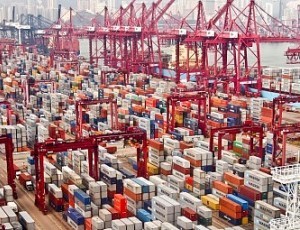China Mulling Further Free Trade Zones After Shanghai FTZ Success
 SHANGHAI – The Director of the Development Research Center of the State Council, Long Guoqiang, has said that China will establish a number of new free trade zones following the success of the Shanghai pilot scheme. While previous announcements to this end had been qualified as provisional, it was definitively stated this week that a number of local and regional governments have already applied to set up their own free trade zones. Long also announced that the Chinese government has agreed that the proliferation of FTZs would be well suited to the growth of foreign trade and the internationalization of the RMB.
SHANGHAI – The Director of the Development Research Center of the State Council, Long Guoqiang, has said that China will establish a number of new free trade zones following the success of the Shanghai pilot scheme. While previous announcements to this end had been qualified as provisional, it was definitively stated this week that a number of local and regional governments have already applied to set up their own free trade zones. Long also announced that the Chinese government has agreed that the proliferation of FTZs would be well suited to the growth of foreign trade and the internationalization of the RMB.
It was further reported that these applications are being processed in coordination with one another and at a restrained pace—it is therefore unlikely that they will all be approved at once. Instead, the additional FTZs will be considered on the basis of their respective advantages to the national economy.
Launched in September 2013, the Shanghai FTZ is specialized in financial services and investment, commodities trading, and logistics. The proposed additional FTZs, however, could develop their own concentrations, including unique tax and other preferential policies. Tax measures applied in the new FTZs, particularly those that threaten to erode the country’s tax base, will remain subject to government approval and alignment with China’s overall tax system regarding inward and outward equity investment.
RELATED: Hengqin New Area Announces Preferential Policies
For comparison, tax incentives currently offered in the Shanghai zone include customs duty and import tax exemptions applied to goods transferred between the FTZ and overseas destinations; immediate export tax rebates on domestic merchandise brought into the zone; and tax exemptions granted on imports of machinery and manufacturing equipment. The zone also allows for income tax to be paid in installments over a five-year period for revaluations arising from asset restructuring.
Meanwhile, the Shanghai Stock Exchange, which has opened a branch in the Shanghai FTZ, is making arrangements with the Hong Kong Stock Exchange to permit Shanghai listed companies onto the Hong Kong bourse, and Hong Kong companies to list in Shanghai. Chinese nationals will be able purchase Hong Kong stocks in RMB, with clearance provided by banks in Hong Kong as part of the territory’s duties as a RMB trading hub.
Asia Briefing Ltd. is a subsidiary of Dezan Shira & Associates. Dezan Shira is a specialist foreign direct investment practice, providing corporate establishment, business advisory, tax advisory and compliance, accounting, payroll, due diligence and financial review services to multinationals investing in China, Hong Kong, India, Vietnam, Singapore and the rest of ASEAN. For further information, please email china@dezshira.com or visit www.dezshira.com.
Stay up to date with the latest business and investment trends in Asia by subscribing to our complimentary update service featuring news, commentary and regulatory insight.
Related Reading
 Guide to the Shanghai Free Trade Zone
Guide to the Shanghai Free Trade Zone
In this issue of China Briefing, we introduce the simplified company establishment procedure unique to the zone and the loosening of capital requirements to be applied nation wide this March. Further, we cover the requirements for setting up a business in the medical, e-commerce, value-added telecommunications, shipping, and banking & finance industries in the zone. We hope this will help you better gauge opportunities in the zone for your particular business.
China Considers Newly Proposed Free Trade Zones
China’s MOFCOM Denies Having Approved 12 New Regional Free Trade Zones
China Approves 12 New Regional Free Trade Zone Proposals
- Previous Article Investment Opportunities in Ningbo, China
- Next Article Britain’s Commonwealth Experience the Key to Accessing Chinese Outbound Investment




























